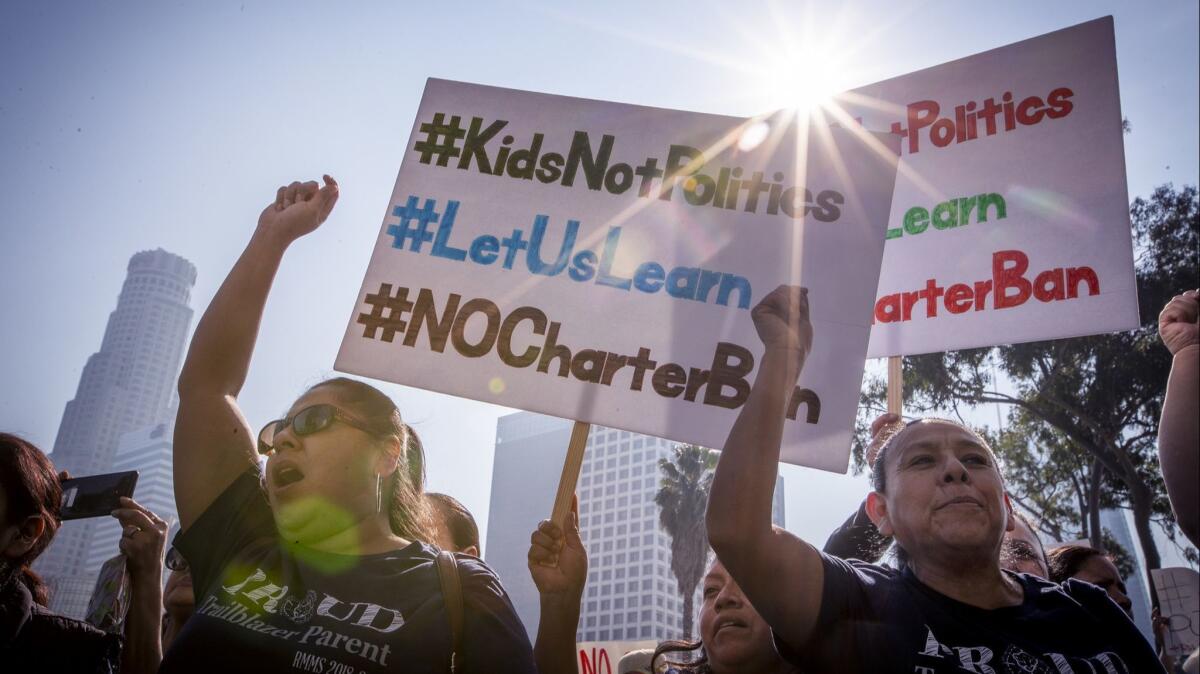Plans to impose a moratorium on new California charter schools stall in Sacramento

Reporting from Sacramento — An intensely debated effort to impose a two-year moratorium on new charter schools in California was scuttled Wednesday at the state Capitol, with supporters of the legislation vowing to try again next year.
Senate Bill 756, part of a package of proposals seen as a brushback pitch to charter schools by the state’s powerful teachers unions, was sidelined by its author, Sen. Maria Elena Durazo (D-Los Angeles). Pro-charter groups believed they had a chance at blocking the bill in its current form. Under legislative rules, the decision to remove the bill from the Senate floor makes it eligible for consideration next January.
Newsom fast-tracks legislation to hold charters to same standards as public schools »
“We are fighting for good public education. It is worth it to take the time to get it done right,” Durazo said in a prepared statement.
SB 756 sought to delay the creation of new charter schools across California until the Legislature crafted rules that limited the power of state education officials to allow new campuses to open without first receiving approval on the local level. Lawmakers, backed by education labor groups, have included some of the anticipated changes in other bills as part of a broader effort to stem the growth of charters, which often operate under leaner governing rules than those that apply to traditional neighborhood schools.
“We need to take the time to address thoroughly the problems with the current laws,” Durazo said in deciding to sideline her legislation. “We need to better understand the impacts of charter schools in our public education system.”
Gov. Gavin Newsom has also embraced the idea of further examining the growth in charter schools, first allowed under California law in 1992. In March, the governor quickly signed legislation requiring new transparency standards for charter schools — even though similar proposals were vetoed by the last two governors. Wealthy political donors who support charter schools gave heavily to Newsom’s gubernatorial rival, former Los Angeles Mayor Antonio Villaraigosa.
A nonpartisan statewide poll in April found a split decision on charter schools — 49% of adults supporting them, 46% opposed — but the survey suggested stronger approval among parents of public school students and significantly higher support when it came to ensuring low-income families have access to the nontraditional schools. SB 756 envisioned a cap on the number of future charter schools, with supporters saying expansion could ultimately divert education funds from existing neighborhood schools.
The issue of slowing down or stopping the expansion of charter schools earlier this month split some local California chapters of the NAACP from the organization’s statewide leadership, which aligned itself with many of the charter criticisms lodged by organized labor.
Charter school advocates celebrated news of the bill’s demise Wednesday, having successfully raised doubts among some members of the Senate about the legislation’s effects. Though Durazo amended the bill last week to shrink the moratorium by almost two-and-a-half years, it was a concession that didn’t do enough to ensure that a majority of her colleagues would support the bill.
“Charter public school families’ voices were heard loud and clear by Sacramento politicians: We cannot and will not accept legislation that limits access to great public schools,” said Myrna Castrejón, president of the California Charter Schools Assn., in a written statement.
Even so, a trio of Assembly bills remains poised to curb the growth and influence of charter schools. Two of those proposed laws — one to limit the establishment of charter schools outside their home school district, another to strengthen the hand of local school boards in rejecting charter applications — passed the lower house earlier this month and are pending in the Senate. As such, neither charter advocates nor critics were prepared Wednesday to stand down in a battle that will continue through the end of the legislative session in mid-September.
Follow @johnmyers on Twitter and sign up for our daily Essential Politics newsletter
More to Read
Get the L.A. Times Politics newsletter
Deeply reported insights into legislation, politics and policy from Sacramento, Washington and beyond. In your inbox three times per week.
You may occasionally receive promotional content from the Los Angeles Times.











